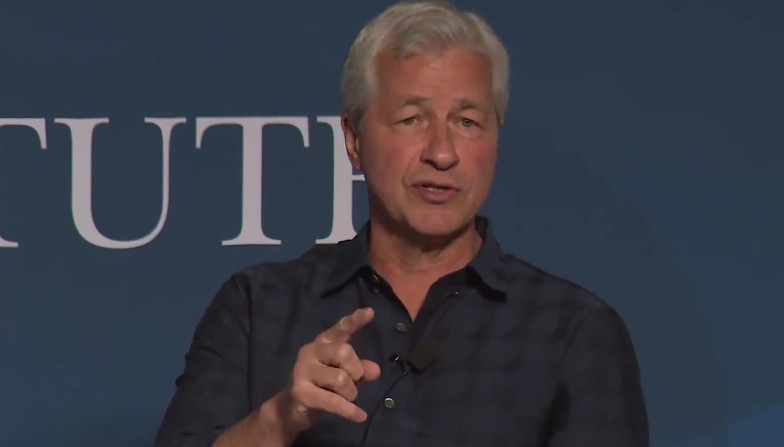What’s good and what’s bad about America right now – Jamie Dimon, CEO of JPMorgan Chase

At the recent Aspen summit, CEO of JPMorgan Chase, a company that has seen a massive increase in confidence (and stock value, which has tripled since the recent financial crisis, doubled since Dimon started in his current position) in recent years, commented on what was strong and what was weak in the current America. Here’s a summary.
The good:
- The economy is booming, with no major potholes
- Wages increasing
- People coming back into work force
- Houses in short supply (a plus for the economy)
- Credit on financial institutions balance sheets is pristine
- Companies have plenty of money
- Tax reform is going to help with retention and reinvestment of capital in America
The bad:
- Uncompetitive business taxes – this has been fixed, though, he noted
- Infrastructure is poor – “We put a man on the moon in 8 years. We can’t fix a bridge in 12 years now.”
- Inner city schools “simply don’t work and we’re relegating generations of minorities and poor kids to poverty.”
- Litigation system “is becoming increasingly capricious.”
- Small business formation (small business, middle market, large corporation all effected) is less than it’s ever been in a major American recovery, as a result of “regulation” and “paperwork,” or bureaucracy and sinecure – a form of corruption in the American system to keep jobs for certain people. (Dimon noted that he wasn’t 100% sure of the particulars of this point, but made it clear he considered it something important to look at.)
- Immigration reform not good enough – “If we had proper immigration reform it would help us grow .2% per year. 300,000 kids get education here and go back home, and then our American universities brag about it like what a good job they’re doing ‘exporting.'”
[somryv url=”CxJXO352x-g” size=”large” align=”center”]
Interpol chief vanishes in China

Family of Interpol Chief Meng Hongwei have not heard from him since he left Lyon, France for China a week ago.
Chinese state news SCMP reported that a source of theirs said that Meng was taken away by “discipline authorities” for questioning in China, although the Chinese government has made no public comment. Meng’s family have reached out to foreign authorities, fearing disciplinary measures against them as well.
Meng is a senior official in China’s CP government.
Disappearances of officials (or anyone) is not uncommon in China, one of the more severe forms of government discipline. Since President Xi took office in 2012, over a million party officials have received some form of discipline, it has been reported.
Interpol tweet:
#NEWS – Media statement concerning INTERPOL President Meng Hongwei. pic.twitter.com/P46AeXsGiS
— INTERPOL (@INTERPOL_HQ) October 5, 2018
New film about Pablo Escobar, but Colombians are asking actor not to play the role with ‘glamour’ so their kids don’t want to repeat the story

Colombian drug war anti-hero Pable Escobar is the subject of a new movie, called “Loving Pablo,” based on a memoir written by a journalist close to the drug king pin, on Mrs. Virginia Vallejo. Vallejo was a lover of Escobar and eventually let U.S. federal agents to him.
However, Colombians asked leading actor, the some-might-say-glamorous-and-cool-already Javier Bardem not to play the role so that Escobar appeared glamourous and cool because they didn’t want the youth to see the movie and want to repeat the story, according to Bardem.
“We wanted to make sure that there was nothing glamorous and iconic to talk about,” the actor said.
Bardem’s take on the idea: “I believe that performing or making movies or any act – discipline, music, writing, sculpture, painting – it’s about bringing mirrors of who we are to ourselves, to get a glimpse of what we can be for the better or for the worse.”
In London, almost 1/2 of new teachers quit in the past 5 years

It’s London’s “teacher crisis.”
Over 4 our of 10 London’s new teachers quit within the past 5 years. That’s 11,000 of the 35,000 newly qualified college grads who enter the profession. Of these, the majority worked in London’s inner city. Also, secondary school teachers were more likely than primary teachers to quit, and the highest rate of quitting was teachers of modern foreign languages, where 42% quit within 5 years.
The causes? Among the top reasons cited by UK experts are heavy workload, stagnant pay, rising living costs and a lack of satisfactory affordable housing. They’ve also faced real-terms pay cuts that have made teaching less appealing than other college graduate professions.
Meanwhile, student numbers are increasing, a trend expected to increase. Secondary pupils are expected to increase almost 20% in the 12 years between 2017 and 2025.
The government is receiving some criticism because they have been spending much more on training new teachers than on keeping teachers who are working.
Policing revolution underway using social media and big data crunching
Police using social media accounts to ensnare protesters is back in the news.
A policing revolution is underway based on what they see as the tool of social media monitoring.
By creating fake accounts for anti-social purposes, social media platforms have “allowed authorities to not only track people but also map out their networks, said Rachel Levinson-Waldman, senior counsel at New York University School of Law’s Brennan Center for Justice.
(NOTE: police’s anti-social use of social media accounts can be contrasted with what many people see as the legitimate use of social media with “fake accounts” which are required to avoid stalkers, unwanted attention, problems at work or in other areas of life, avoid government persecution or oppression, speak without fear of retribution, and other uses of anonymity in the social media realm.)
As to the police’s use, an officer who uses an undercover account anonymously told NBCNews, “Every high-tech crime unit has one. It’s not uncommon, but we don’t like to talk about it too much.”
Two of the most common types of profiles police create are 1)a fake protester or political activist and 2)a pretty girl or woman.
Ford Super Chief

Ford pickups have been part of Americana for decades. My family had one, a Ford F-150 XL, capable of hauling all of us and our various bits of luggage and musical instruments without being too cramped. Ford’s pickup line has been used on all sorts of terrain, for many different jobs, and by a wide range of people.
This newest iteration of the pickup, the Ford F-250 Super Chief, looks to be marketed toward those rough and ready drivers who need a truck for the long haul, one that can handle tough farming work but looks big and aggressive enough to show off during hunting and fishing season.
With updated technology that promotes being green, it’s also a good choice for those who need a hauler but don’t want a gas-guzzling fiend with an awful amount of emissions. It will also please tech heads, who can use the Bluetooth, WiFi, and satellite navigation to their hearts’ content. And for those who love a luxury vehicle, the leather seating and steering wheel and HVAC technology promise the ultimate comfort ride.
Ford’s F-250 Super Chief is a truck that will make a definite impression, no matter where it goes. If you’re looking for a statement piece, look no further.
Interested in learning more about this 2017 Ford truck? You can find a write-up of all its features and design elements at Ford Release Date.
